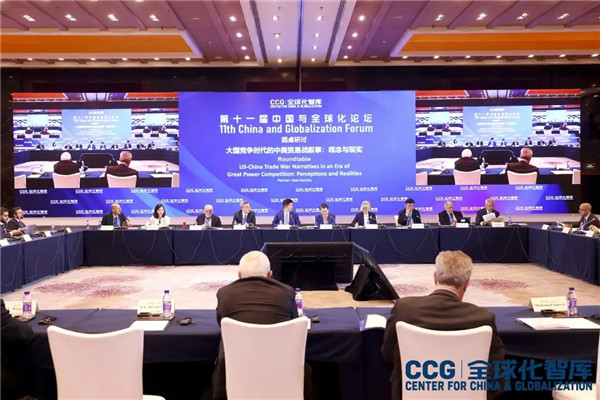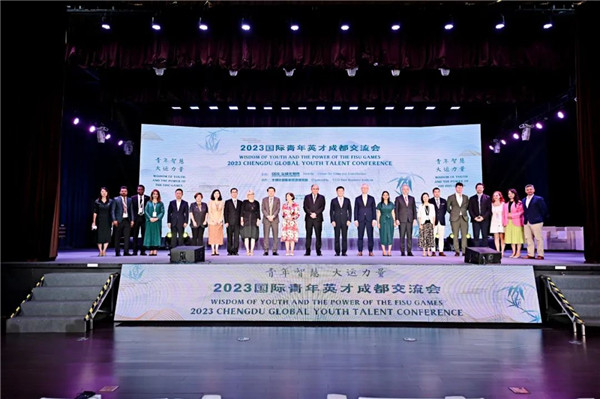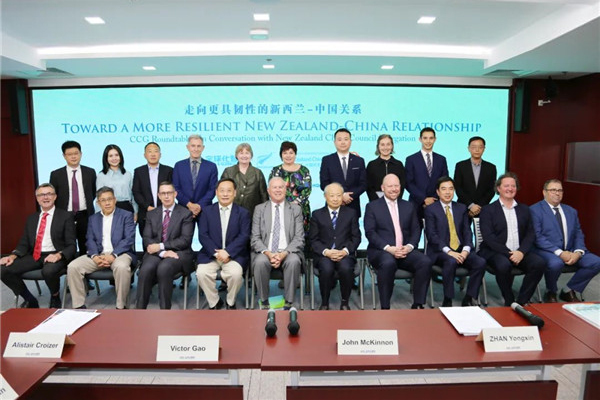Analyze future scenarios for the US-China trade dispute|CCG launches new report in Washington at the Hudson Institute
Against a backdrop of escalating tensions in the ongoing US-China trade dispute, on September 24, a CCG delegation traveled to Washington for a five-day visit to conduct over 20 activities as part of Track II diplomacy efforts to promote bilateral trust and understanding.

On September 26, along with leading conservative think the Hudson Institute, CCG co-hosted a symposium titled “40 Years of Sino-US relations: Past, Present, Future and Policy Recommendations.”

Kenneth R. Weinstein, President and CEO of Hudson Institute, gave opening remarks at the start of the event, which was chaired by Michael Pillsbury, Hudson Institute senior fellow and Director for China Strategy.

Wang Huiyao, President of CCG

Miao Lu, CCG Vice President
At the symposium, CCG President Wang Huiyao and CCG Vice President Miao Lu presented CCG’s new report China-US Trade Relations and Challenges: Past, Present, Future and Policy Options.
Based on CCG’s ongoing in-depth research into China’s economic development and relations with the US, this report traces the evolution of Sino-US ties over the last four decades, highlighting the significant benefits that both sides have derived from increasing economic cooperation. The report also analyses the factors that have shaped the dispute over recent months and the potential impacts of a trade war, based on a three scenario framework. This event marked the first time that a Chinese think tank had released research findings on the Sino-US economic relationship at a leading conservative think tank.

To assess the potential impact of the trade war, the report maps out three scenarios. The first (best-case) scenario in which the two sides reach an agreement and subsequently halt the tariff measures; the second (medium) scenario forecasts a longer-term trade conflict that is nevertheless measured and contained; and the third (worse-case) scenario projects continued escalation into an all-out trade war.
The report highlights how deeply intertwined Chinese and US economic interests have become over the last 40 years of continued integration. US companies earn significant profits in China, which is set to become the world’s biggest market in the future. As the world’s two largest economies, the US and China collectively account for almost half of global GDP, underwriting global prosperity. The report emphasizes how a trade war between the two will inevitably lead to a lose-lose outcome, harming not only both countries but also the global economy at large.
In this report, CCG also puts forward over ten recommendation for policymakers on how to resolve the dispute and facilitate deeper Sino-US cooperation. These include:
1.Build on the agreements already reached through bilateral negotiations and work to increase Sino-US bilateral trade and opportunities in services trade.
2.Forge a new bilateral agreement on intellectual property rights (IPR).
3.Increase opportunities for US companies in China Manufacturing 2025.
4.Seek further tariff reduction through bilateral negotiations and re-engage in BIT talks.
5.Build on the foundation of domestic reforms to rebalance the Chinese and US economies as ways to achieve trade balance.
6.Update the way that Sino-US trade is measured to more accurately reflect the value derived by each side.
7.Expand cooperation in infrastructure and explore creating a Sino-US infrastructure investment fund.
8.China and the US can work together to reform the WTO.
9.Strengthen Sino-US cooperation between provinces and States.
10.Develop the role of Track II diplomacy and promote bilateral dialogue.
The symposium and launch of the report attracted nearly 100 officials and experts from the US government, leading think tanks, the Chinese Embassy to the US, and representatives of business and international media. Leading experts in relevant fields such as Sino-US relations, trade, and IPR participated in a lively discussion and exchange of ideas. This included Curtis Ellis, senior policy adviser with America First Policies and former executive director of the American Jobs Alliance; Ambassador Husain Haqqani, former ambassador of Pakistan to the US and Senior Fellow and Director, South and Central Asia, Hudson Institute; Arthur Herman, Senior Fellow at the Hudson Institute; Aparna Pande, Research Fellow and Director, Initiative on the Future of India and South Asia, Hudson Institute; Richard Weitz, Senior Fellow and Director of the Center for Political-Military Analysis at Hudson Institute; and Deng Xiwei, CCG Non-Resident Senior Fellow and Professor at the University of International Business and Economics.
In his opening remarks, Hudson CEO Kenneth R. Weinstein said that the US hoped for a more open China, for both sides to strengthen mutual understanding and the find resolutions to the current trade dispute.

Michael Pillsbury, Hudson Senior Fellow and Director for China Strategy, emphasized the value of exchange between Chinese and US think tanks and acknowledged the work of CCG in striving to increase bilateral understanding amidst the trade dispute.

Curtis Ellis, senior policy adviser with America First Policies and advisor to Trump’s election campaign, also shared comments.

Panel 1: 40 Years of US-China Trade Relations in Review

Panel 2: Policy Options and Future Scenarios
Following the event, the CCG delegation continued discussions on Sino-US economic relations and prospects for cooperation over lunch with counterparts from Hudson Institute and US officials.

CCG exchange with the Hudson Institute and track II diplomacy
Founded in 1961 by strategist Herman Kahn, the Hudson Institute is considered one of the US’ five leading conservative think tanks and seen as an important advisory body for the White House. Hudson’s Director for China Strategy, Michael Pillsbury, was recently cited by President Trump as a “leading authority” on China.
In recent months, CCG has held a series of exchanges with the Hudson Institute. In June this year, Hudson participated in CCG’s 2018 Annual China Global Think Tank Innovation Forum. In July, CCG and Hudson Institute co-hosted a seminar in Beijing on US-China trade frictions.
This CCG delegation visit to the US follows immediately after the US and China enacted a new round of tariffs and China released a white paper titled The Facts and China’s Position on China-U.S. Trade Friction.

Over the five-day visit, as part of Track II efforts, CCG met with leading experts and officials from a number of institutions to exchange ideas and viewpoints. CCG held meetings with top Washington think tanks and organizations including the Wilson Center, the Council on Foreign Relations, the Center for Strategic and International Studies (CSIS), the Hudson Institute, US-China Business Council, The Heritage Foundation, and the Asia Society Policy Institute. CCG also made visits to the Chinese Embassy to the US, the US Department of Commerce, the House of Representatives US-China Working Group, the Committee of 100, China’s Mission to the United Nations, and the United Nations Industrial Development Organization (UNIDO)

The CCG delegation included CCG President Wang Huiyao; CCG Vice President Miao Lu; Dr. Wenshan Jia, CCG Senior Non-resident Fellow and Professor of Journalism, Renmin University of China; Li Weifeng, CCG Executive Secretary-General; Li Yeqing, CCG Non-Resident Senior Fellow and President of the America-China Society; Tang Beijie, CCG Deputy Secretary-General; Deng Xiwei, CCG Non-Resident Senior Fellow and Professor at the University of International Business and Economics; Xiao Huilin, CCG Senior Research Fellow; CCG Deputy Secretary-General Xu Haiyu; and Ma Hongxia, CCG Shanghai Secretary-General.





